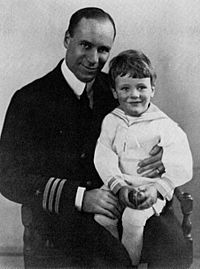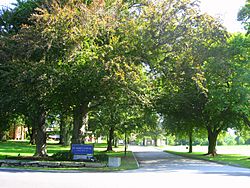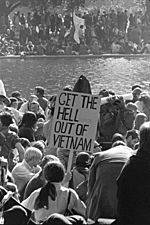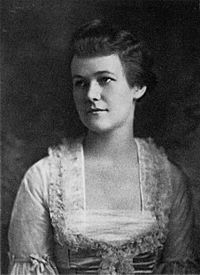Robert Lowell facts for kids
Quick facts for kids
Robert Lowell
|
|
|---|---|
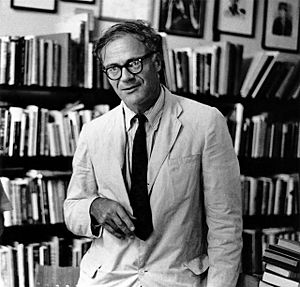
At the Grolier Poetry Bookshop in Harvard Square, 1965
|
|
| Born | Robert Traill Spence Lowell IV March 1, 1917 Boston, Massachusetts, U.S. |
| Died | September 12, 1977 (aged 60) New York City, U.S. |
| Resting place | Stark Cemetery Dunbarton, New Hampshire, U.S. |
| Occupation | Poet |
| Period | 1944–1977 |
| Genre | American poetry |
| Literary movement | Confessional poetry |
| Notable works | Lord Weary's Castle, Life Studies, For the Union Dead, The Dolphin (1973) |
| Spouse |
Jean Stafford
(m. 1940; div. 1948)Elizabeth Hardwick
(m. 1949; div. 1972)Caroline Blackwood
(m. 1972) |
| Children | 2 |
Robert Lowell (born March 1, 1917 – died September 12, 1977) was an important American poet. He came from a very old and famous family in Boston, Massachusetts. His family's history and his life in Boston were often important topics in his poems.
Lowell was influenced by other poets like Allen Tate, Elizabeth Bishop, and William Carlos Williams. He wrote poetry in different styles. Sometimes he used formal, rhyming verse, and other times he used a more free, conversational style.
His 1959 book, Life Studies, was very famous and won the 1960 National Book Award. This book was known for talking openly about personal and family struggles. Because of this, he became a key part of a new style called "confessional poetry." However, much of Lowell's work also mixed personal feelings with public events.
Lowell won many awards, including the Pulitzer Prize for Poetry twice (in 1947 and 1974). He was also the sixth Consultant in Poetry to the Library of Congress (a role now called the U.S. Poet Laureate). Many people see him as one of the most important American poets after World War II.
Contents
Robert Lowell's Life Story
His Family Background
Robert Lowell was born in Boston, Massachusetts. His family, the Lowells, was a very well-known and influential family in Boston. Many of his relatives were famous poets, writers, or important figures in history. For example, his family included poets Amy Lowell and James Russell Lowell.
His mother's family also had many famous ancestors. These included people who signed the United States Constitution and early American leaders. Lowell's family history, with its deep roots in America, often appeared in his poems.
Growing Up and School
As a child, Lowell could be a bit rough. When he was a teenager, his friends nicknamed him "Cal." This name came from two powerful figures: Caliban, a character in Shakespeare, and Caligula, a Roman emperor. This nickname stayed with him his whole life.
Lowell went to St. Mark's School, a well-known prep school. There, he met the poet Richard Eberhart, who taught him. This is where Lowell decided he wanted to be a poet. He also became good friends with Frank Parker, an artist who later designed the covers for many of Lowell's books.
He studied at Harvard College for two years. During this time, he visited the famous poet Robert Frost to get advice on a long poem he had written. Frost told him he needed to make his writing more focused.
Lowell then decided to leave Harvard. He went to study with the poet Allen Tate in Nashville. For a short time, Lowell even lived in a tent on Tate's lawn! Later, he followed Tate and another professor, John Crowe Ransom, to Kenyon College. He studied Classics there and graduated with top honors.
After college, Lowell became a Catholic, partly as a way to be different from his parents. He also taught English for a year before World War II began.
Standing Up for What's Right
Lowell was a conscientious objector during World War II. This means he refused to fight because of his beliefs. He wrote a letter to President Franklin Roosevelt explaining his reasons. He believed the war's goals might lead to too much destruction. Because of his refusal, he spent several months in a federal prison. He later wrote about this experience in a poem called "Memories of West Street and Lepke."
Lowell continued to speak out on important issues. In the 1960s, he strongly opposed the Vietnam War. He turned down an invitation to the White House from President Lyndon Johnson to protest the war. He even published his letter to the president in The New York Times.
He also took part in the March on the Pentagon in 1967. He was one of the speakers at this large protest. The writer Norman Mailer described Lowell's involvement in his book The Armies of the Night.
In 1968, Lowell supported Senator Eugene McCarthy in his campaign for president. He spoke at many events for McCarthy.
Teaching and Mentoring
From 1950 to 1953, Lowell taught at the famous Iowa Writers' Workshop at the University of Iowa. Later, he taught at Boston University, where his students included future famous poets like Sylvia Plath and Anne Sexton.
He also taught at other universities, including Yale University and Harvard University. Many writers and scholars have written about how Lowell's teaching style influenced them. One student, Kathleen Spivack, even wrote a book about her experience studying with him.
The scholar Helen Vendler said that Lowell talked about poets in class as if they were his friends. Students noted that he often told stories about the poets' lives, making them seem very real and current.
His Impact on Poetry
In 2005, the Academy of American Poets called Lowell's book Life Studies one of the most important books of the 20th century. It had a huge impact, especially on the "confessional poetry" movement. This style of poetry focused on intense, personal, and emotional experiences.
Poets like Sylvia Plath and Anne Sexton were greatly influenced by Life Studies. Plath said that Lowell's poems about his time in a mental hospital were very interesting to her. Another poet, Stanley Kunitz, said that Life Studies was perhaps the most influential book of modern poetry since T. S. Eliot's The Waste Land.
In the 1960s, Robert Lowell was the most famous American poet. In 1967, he was even featured on the cover of Time magazine, which called him "the best American poet of his generation."
Personal Relationships
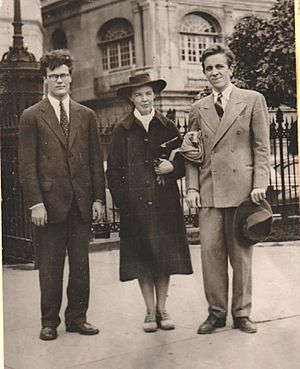
Lowell married the writer Jean Stafford in 1940. Before they married, they were in a serious car crash while Lowell was driving. Stafford was badly hurt and needed many surgeries. Their marriage was difficult and ended in 1948.
In 1949, Lowell married another writer, Elizabeth Hardwick. They had a daughter named Harriet in 1957. Their marriage was also complicated, and Lowell wrote about it in some of his later books. After 23 years, they divorced in 1972.
Lowell then married Caroline Blackwood in England, where they lived and raised their son, Sheridan. He also became a stepfather to Blackwood's daughter, Ivana, and wrote a poem for her.
Lowell had a very close friendship with the poet Elizabeth Bishop. They often shared their poems and gave each other feedback. Their letters, published in a book, show how much they influenced each other's work. Bishop's ideas inspired some of Lowell's most popular poems, like "Skunk Hour."
He was also close friends with Randall Jarrell from their college days until Jarrell's death. Lowell often asked Jarrell for his thoughts on his poems before publishing them.
Dealing with Mental Health
Throughout his adult life, Robert Lowell was hospitalized many times for a mental condition called bipolar disorder. This condition caused him to experience extreme mood changes. He often stayed at the McLean Hospital, a psychiatric facility, which he mentioned in his poem "Waking in the Blue."
While his bipolar disorder was very challenging for him and his family, it also became a topic for some of his most important poetry, especially in Life Studies. Later in his life, he began taking medication that helped him manage the condition. He was always concerned about how his illness affected his loved ones.
His Passing
Robert Lowell died from a heart attack in a taxi in New York City on September 12, 1977. He was 60 years old. He was on his way to see his ex-wife, Elizabeth Hardwick. He was buried in Stark Cemetery in Dunbarton, New Hampshire.
Robert Lowell's Writings
Early Poems (1940s)
Lowell's first poems were known for their Christian themes, historical references, and complex, formal style. His first three books were influenced by his college professors, who were part of a group called the "New Critics."
His first book, Land of Unlikeness (1944), showed the influence of his conversion to Catholicism. It received good reviews from poetry magazines.
In 1946, Lowell became widely famous for his next book, Lord Weary's Castle. This book included some revised poems from his first book and many new ones. It won the Pulitzer Prize in 1947. The poet Randall Jarrell praised it highly, saying that some of its poems would be read for a very long time.
After this success, Lowell served as the Consultant in Poetry to the Library of Congress from 1947 to 1948.
A New Style (1950s)
In 1951, Lowell published The Mills of the Kavanaughs, which focused on a long poem. It didn't receive as much praise as his previous book. After this, Lowell took a long break from publishing new poems.
However, by the end of the 1950s, he started writing again with a new style. His book Life Studies (1959) won the National Book Award and became his most influential work.
The poems in Life Studies used a mix of free verse and more traditional styles. They also used more everyday language than his earlier works. This book was a major turning point for Lowell and for American poetry. Many poems in it shared details from Lowell's family life and personal struggles. Because of this, one critic called them "confessional" poems. This label stuck, and Lowell became known as a leader of the confessional poets, along with his former students Sylvia Plath and Anne Sexton.
Translations and Public Poems (1960s)
After Life Studies, Lowell published Imitations (1961). This book contained his own versions of poems by European poets like Rilke and Baudelaire. He called them "imitations" because he took many freedoms with the original poems. He wanted to imagine how these poets might write if they were living in America today.
In 1961, Lowell also published his English translation of the French play Phèdre by Jean Racine. He called his version Phaedra. This was his first attempt at translating a play, and it was generally well-received.
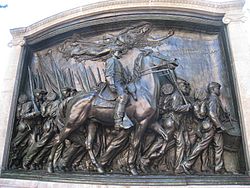
Lowell's next book of original poems, For the Union Dead (1964), was highly praised. Its most famous poem, also called "For the Union Dead," honors a Civil War hero, Robert Gould Shaw, and a memorial statue in Boston. In this book, Lowell wrote about important issues like civil rights and the environment. He continued the more personal style he started in Life Studies. He also wrote about historical figures and combined personal feelings with public concerns, like his fear of nuclear war during the Cold War.
In 1964, Lowell also wrote three short plays called The Old Glory. These plays were based on stories by American authors Nathaniel Hawthorne and Herman Melville. The Old Glory was performed in New York City and won several awards, including "Best American Play."
In 1967, Lowell published Near the Ocean. In this book, he returned to writing more formal, rhyming poems. It also included more of his "loose translations." The poem "Waking Early Sunday Morning" in this book became known as an important "political poem" of the 1960s.
During 1967 and 1968, Lowell experimented with a new style of writing, creating a "verse journal." These poems were published as Notebook 1967-68. He called these fourteen-line poems "sonnets," even though they didn't always follow the strict rules of traditional sonnets. He wanted to capture "the immediate instant" where personal and political events mixed with his memories. He liked this new form so much that he used it for his next three books of poetry.
In 1969, Lowell published his translation of the ancient Greek play Prometheus Bound by Aeschylus.
Later Works (1970s)
In 1973, Lowell published three books of sonnets: History, For Lizzie and Harriet, and The Dolphin. History contained poems about world history and his friends and family. For Lizzie and Harriet focused on the end of his second marriage. The Dolphin (which won the 1974 Pulitzer Prize) included new poems about his daughter, his ex-wife, and his new wife, Caroline Blackwood, whom he called "Dolphin."
These sonnet books received mixed reviews from critics. Some praised them, while others found them less focused than his earlier work.
Lowell published his last book of poetry, Day by Day, in 1977, the year he died. This book won the National Book Critics Circle Award. It was his only book written entirely in free verse. In these poems, Lowell looked back on his life, his relationships, and his own aging. The last poem, "Epilogue," talks about the "confessional" style of poetry that he was known for.
Critics had different opinions about Day by Day. Some thought it was a success, while others found it different from his usual style. Helen Vendler, a scholar, argued that critics were disappointed because it was so different. She said Lowell became more open and honest in this book, showing his shame and uncertainty, and letting the poems drift from one idea to another.
Books Published After His Death
In 1987, Lowell's editor published his Collected Prose, which included his essays and parts of an unfinished autobiography.
In 2003, Lowell's Collected Poems was published. This large book included almost all of his major works. In 2005, The Letters of Robert Lowell was also published. Both of these books received good reviews.
Tributes to Robert Lowell
In 2001, the band They Might Be Giants wrote a song called "Robert Lowell." The lyrics for the song were based on Lowell's poem "Memories of West Street and Lepke."
Lowell's friendship with Elizabeth Bishop was the subject of a play called Dear Elizabeth by Sarah Ruhl. The play was first performed in 2012 and used their letters to each other as its basis.
Lowell was also featured in a 2014 documentary called The 50 Year Argument. This film was about The New York Review of Books, a magazine that Lowell and his second wife, Elizabeth Hardwick, helped to start. Lowell often wrote for the magazine.
Images for kids
-
Robert Lowell, Jean Stafford (Lowell's first wife), and Peter Taylor in front of The Presbytere at Jackson Square in New Orleans in 1941. Photo by Robie Macauley
-
The Memorial to Robert Gould Shaw and the 54th Massachusetts Volunteer Infantry Regiment by Augustus Saint-Gaudens in Boston. The bronze bas-relief memorial figures prominently in Lowell's poem "For the Union Dead."
See Also
 In Spanish: Robert Lowell para niños
In Spanish: Robert Lowell para niños
 | Sharif Bey |
 | Hale Woodruff |
 | Richmond Barthé |
 | Purvis Young |


